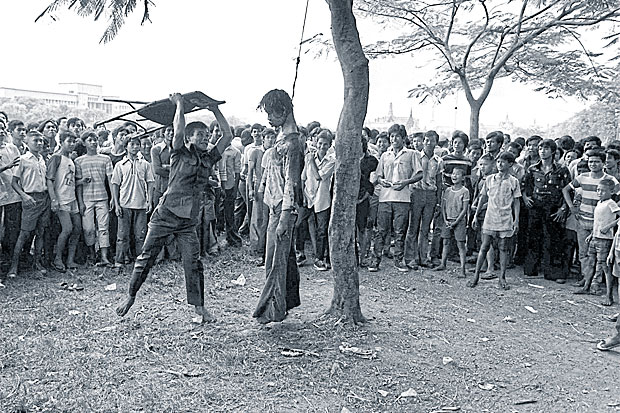 |
| The picture taken by Neal Ulevich outside Thammasat University in Bangkok on Oct 6, 1976. Photo: AP / NEAL ULEVICH |
In the eye of the storm
Exactly four decades
after his iconic photograph of the Oct 6, 1976, Thammasat massacre, Neal
Ulevich reflects on the circumstances of history captured through the
lens
Bangkok Post | 30 September 2016
The photograph is brutal because the reality is brutal.

As memories fade and truth
remains clouded, a particular photo has grown in implication, in reflection and
in sheer horror. There's a lot of photographs and news footage from the morning
of Oct 6, 1976, when the police and right-wing militia laid siege and attacked
students at Thammasat University, killing and brutalising scores in one of the
worst bloodsheds in Thailand's modern history. But it's the one image taken by
AP photographer Neal Ulevich that encapsulates the senseless brutality, and the
madness, of that morning 40 years ago: a mutilated corpse dangling from a tree
in Sanam Luang as a man is about to bash the lifeless body with a folding
chair. The photograph, even more chilling to some, also shows a boy standing
among the onlookers laughing.
The importance of Ulevich's
picture as a historical record is immense, becoming even more so over the
decades as society has gone through other clashes of ideologies, leaving more
dead bodies on the street. Today the "chair" photograph is invariably
used to exemplify the worst outcome of a conflict spiralling out of control
after nationalistic propaganda plants fear and hatred of political enemies. (In
1976 it was the communists.) The eerie power of the picture has also evolved
over the past 40 years: it was used as an album cover of an American rock band
(Ulevich didn't realise it until he saw it); it inspired several Thai theatre
productions and movies; and has been used in countless satirical internet
memes. The word kao-ee, or "chair" --
referring to the chair in the photo -- has also acquired a jokey, colloquial
connotation in certain circles in Thailand, meaning a threat to those who have
anti-establishment thoughts.
Ulevich, now 70, won a Pulitzer
Prize for the photographs he took. After stints in Bangkok, Beijing and Tokyo,
he moved back to the US in 1990. For one of our articles commemorating the 40th
anniversary of the Oct 6 atrocity, we contacted him through email -- which he
preferred to Skype -- and asked him about the events of that day. Here's an
edited version of the conversation.
When
did you arrive at Thammasat on Oct 6? Things had been tense, especially on Oct
5. In the days leading up to Oct 6, did you feel at any point that things could
turn violent?


No comments:
Post a Comment